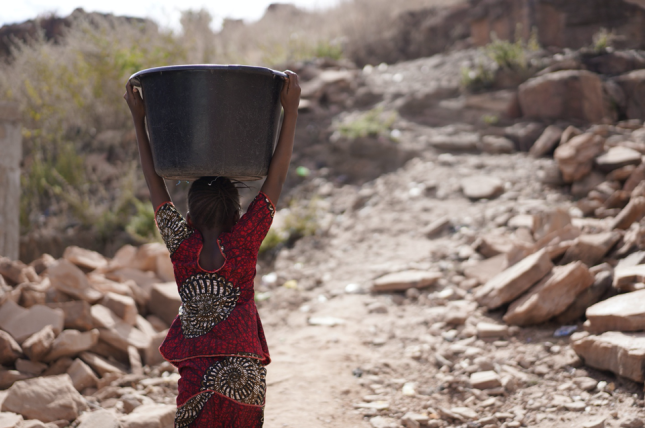-
Gender Equality is Important to Building Resilience and Peace during Disasters and Conflict
September 28, 2020 By Cindy Zhou
“The gender perspective highlights how pre-existing inequalities and vulnerabilities are exacerbated in conflict and in disasters,” said Susanne Kozak, a doctoral candidate at Monash University at a recent event hosted by the Environmental Peacebuilding Association and University of Melbourne’s Faculty of Science.
Conflict and natural disasters are often correlated: approximately 58 percent of deaths related to natural hazards take place in the world’s 30 most fragile states. “[T]he relationship between disasters and conflicts can be and often is mutually reinforcing,” said Marisa Ensor, Adjunct Professor at Georgetown University’s Justice and Peace Studies Program. “Disasters that occurred in conflict-affected and fragile contexts are likely to exacerbate the impacts and fault lines of that conflict. At the same time, the impacts of disasters such as food insecurity and disruption of markets have the potential to reinforce drivers of conflict.”
Because they lead to displacement, loss of livelihoods, and increased care-related tasks, conflict and disaster disproportionately affect women and girls. Gender inequalities often worsen in post-disaster situations, said University of Nairobi’s Isaac Ombara. And gender inequality is one of the biggest challenges in advancing the environmental aspect of sustainable development because it restricts women’s access to natural resources, including through unequal land tenure systems.
In South Sudan, one of the top five countries most vulnerable to climate change, flooding since July has displaced more than 600,000 people. Many of these communities practice transhumant pastoralism, said Ensor, in which men move with their livestock while women, children, and the elderly remain in place. When disaster strikes, it’s the women, children, and elderly who make up the largest proportion of the displaced.
At the same time, women play a key role in conflict and disaster responses. Resilience and recovery rely on the hidden labor of unpaid care and domestic work, which is largely performed by women, said Kozak. Many resilience-building interventions fail to consider this, but crises like the COVID-19 pandemic have demonstrated how this gendered division of labor can disproportionately increase the amount of work for women in comparison to men. Women overall are more affected by the pandemic due to increased gender-based violence (GBV) and limited access to sexual and reproductive healthcare.
Resilience-building interventions aimed towards climate change adaptation and disaster risk reduction must also address GBV if they are to strengthen peace and security, said Virginie Le Masson, a research associate at the Overseas Development Institute. It is the everyday violence perpetrated against girls and women by their own family and community members that undermines resilience—almost regardless of the natural disasters that affect where they live, said Le Masson. GBV prevents women and girls from contributing financially and holding decision-making power, she said.
Women are most affected by disaster and conflict, but they are also often on the frontlines of crisis responses. Gender equality may be a missing link in establishing resilience and peace. Within this phenomenon of conflict and disaster is a window of opportunity to change the societal structures governing gender equality, said Ombara.
Read More:
- States need to better consider gender when addressing climate and security issues.
- Investing in girls’ education and family planning can improve food security and public health in the Sahel.
- How do climate and conflict define current crises and how should we respond to them together?
- Addressing gender-based violence and empowering women are critical to humanitarian aid.
Sources: Environmental Peacebuilding Association, Overseas Development Institute, ReliefWeb, United Nations Entity for Gender Equality and the Empowerment of Women, United Nations Environment Programme
Photo Credit: Shutterstock.com, All Rights Reserved.
Topics: conflict, disaster relief, flooding, gender, On the Beat, risk and resilience, South Sudan, youth
 A Publication of the Stimson Center.
A Publication of the Stimson Center.



